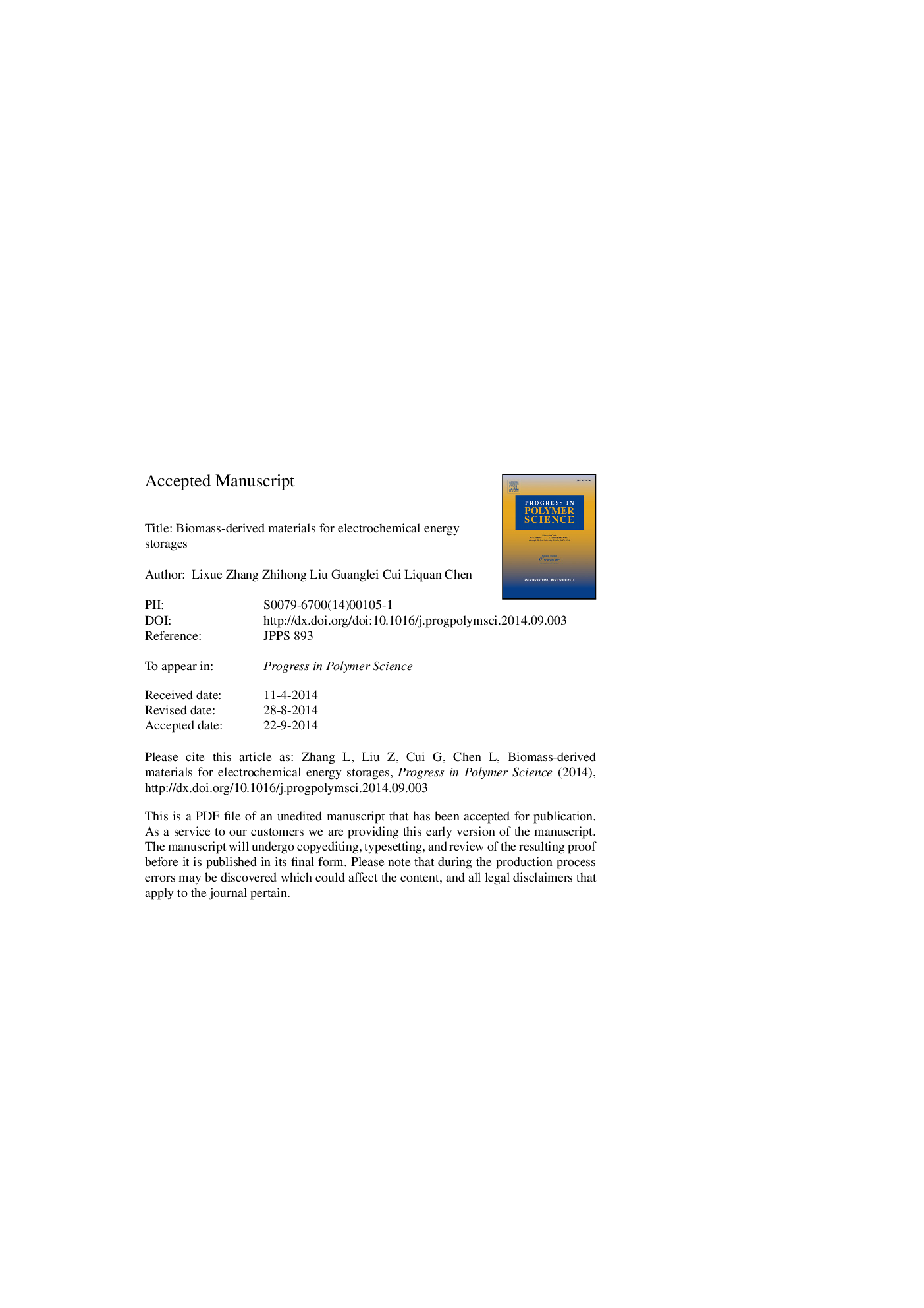| کد مقاله | کد نشریه | سال انتشار | مقاله انگلیسی | نسخه تمام متن |
|---|---|---|---|---|
| 5208101 | 1503012 | 2015 | 67 صفحه PDF | دانلود رایگان |
عنوان انگلیسی مقاله ISI
Biomass-derived materials for electrochemical energy storages
ترجمه فارسی عنوان
مواد مشتق شده از مواد بیولوژیکی برای ذخیره انرژی الکتریکی
دانلود مقاله + سفارش ترجمه
دانلود مقاله ISI انگلیسی
رایگان برای ایرانیان
کلمات کلیدی
مواد مشتق شده از بیوماس، ذخیره انرژی الکتروشیمیایی، جدا کننده ها، پوشه ها، مواد الکترود،
ترجمه چکیده
در طول دهه گذشته، انسانها شاهد گسترش چشمگیر تحقیقات بنیادین و همچنین تجاری سازی در زمینه ذخیره انرژی الکتریکی بوده اند که به دلیل نیاز فوری دستگاه های الکترونیکی قابل حمل، وسایل نقلیه الکتریکی، حمل و نقل و ذخیره انرژی تجدید پذیر برای شبکه برق در اقتصاد انرژی پاک است. باتری های لیتیومی و خازن های الکتروشیمیایی می توانند انرژی شیمیایی ذخیره شده را به انرژی الکتریکی تبدیل کنند و در حال حاضر دستگاه های قابل شارژ سریع هستند. با این حال، ویژگی (از جمله تراکم انرژی، هزینه و مسائل ایمنی، و غیره) گزارش شده برای این دستگاه های قابل شارژ فعلی هنوز نمی تواند مورد نیاز برای وسایل نقلیه الکتریکی و ذخیره انرژی شبکه، که به طور عمده توسط خصوصیات محدود مواد اصلی ( مثلا آند، کاتد، الکترولیت، جداساز و گیربکس) که توسط این دستگاه ها استفاده می شود. علاوه بر این، این مواد کلیدی به طور معمول دور از تجدید پذیر و پایدار است. بنابراین چالش ها و فرصت های بزرگی همچنان به دست می آید که مواد سبز و کم هزینه با عملکرد بالا جستجو شوند. تعداد زیادی از خواص مواد زیست توده مانند بازسازی، کم هزینه، فراوانی زمین، ساختار خاص، اموال مکانیکی و بسیاری دیگر، بسیار جذاب هستند. این خواص نشان می دهد که زیست توده می تواند بعضی از مواد کلیدی را در سیستم های ذخیره انرژی الکتریکی جایگزین کند. در این بررسی ما بر مبانی و کاربرد مواد مشتق شده از مواد شیمیایی در تکنیک های ذخیره سازی انرژی الکتروشیمیایی تمرکز می کنیم. به طور خاص، ما پیشرفت های اخیر استفاده از بیوماس های مختلف را به عنوان جداساز، اتصال دهنده ها و مواد الکترود خلاصه می کنیم. در نهایت، چندین دیدگاه مربوط به مواد مشتق شده از مواد بیولوژیکی برای انبارهای الکتروشیمیایی براساس پیشرفت گزارش شده و ارزیابی خود ما، با هدف ارائه مسیرهای تحقیقاتی احتمالی در این زمینه، پیشنهاد شده است.
موضوعات مرتبط
مهندسی و علوم پایه
شیمی
شیمی آلی
چکیده انگلیسی
During the past decade humans have witnessed dramatic expansion of fundamental research as well as the commercialization in the area of electrochemical energy storage, which is driven by the urgent demand by portable electronic devices, electric vehicles, transportation and storage of renewable energy for the power grid in the clean energy economy. Li-secondary batteries and electrochemical capacitors can efficiently convert stored chemical energy into electrical energy, and are currently the rapid-growing rechargeable devices. However, the characteristic (including energy density, cost, and safety issues, etc.) reported for these current rechargeable devices still cannot meet the requirements for electric vehicles and grid energy storage, which are mainly caused by the limited properties of the key materials (e.g. anode, cathode, electrolyte, separator, and binder) employed by these devices. Moreover, these key materials are normally far from renewable and sustainable. Therefore great challenges and opportunities remain to be realized are to search green and low-cost materials with high performances. A large number of the properties of biomass materials-such as renewable, low-cost, earth-abundant, specific structures, mechanical property and many others-are very attractive. These properties endow that biomass could replace some key materials in electrochemical energy storage systems. In this review, we focus on the fundamentals and applications of biomass-derived materials in electrochemical energy storage techniques. Specifically, we summarize the recent advances of the utilization of various biomasses as separators, binders and electrode materials. Finally, several perspectives related to the biomass-derived materials for electrochemical energy storages are proposed based on the reported progress and our own evaluation, aiming to provide some possible research directions in this field.
ناشر
Database: Elsevier - ScienceDirect (ساینس دایرکت)
Journal: Progress in Polymer Science - Volume 43, April 2015, Pages 136-164
Journal: Progress in Polymer Science - Volume 43, April 2015, Pages 136-164
نویسندگان
Lixue Zhang, Zhihong Liu, Guanglei Cui, Liquan Chen,
